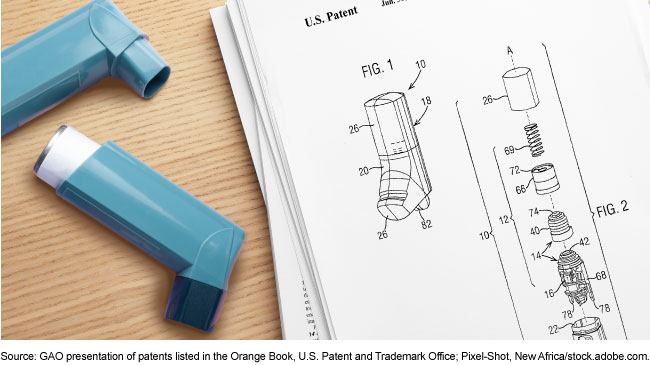Generic Drugs: Stakeholder Views on Improving FDA's Information on Patents
Fast Facts
The Orange Book is a list of FDA-approved drugs. It helps generic drug companies identify when patents for brand name drugs will expire so they can market generic equivalents. For makers of brand name drugs, listing patents gives them time to resolve patent disputes before a generic can be offered for sale.
Views varied, but some stakeholders had concerns that certain patent listing practices can delay access to generic drugs—especially those with a device, like inhalers. Some stakeholders said that delays were largely due to brand name companies getting additional patents for minor changes to a drug or device—extending patent protections.

Highlights
What GAO Found
The Food and Drug Administration (FDA) is required to publish information on patents for approved brand name drugs in a publication known as the Orange Book. FDA regulations describe to brand name drug companies (sponsors) the patent information that should be submitted for listing in the Orange Book. FDA then publishes this information with a generally minimal review. This information can help generic drug sponsors determine when to seek FDA approval for the product they want to market. Listing patents in the Orange Book can also help brand name sponsors facing generic competition by providing additional time to resolve patent disputes before a generic product enters the market. Some research has raised questions about whether certain patent practices may delay generic competition, particularly for products that comprise a drug and a device, known as a drug-device combination product.
Stakeholders GAO interviewed provided varying views on how Orange Book patent listings may affect the entry into the U.S. market of generic drug-device combination products and FDA's role in overseeing patent listings.
- Effect on generic market entry. All 15 of the stakeholders GAO interviewed agreed that the Orange Book may help generic drug sponsors identify relevant patents when making product development decisions. However, there was not consensus on whether the patent information listed in the Orange Book may delay entry of generic drug-device combination products into the market. Some stakeholders and research suggested other factors—such as brand name sponsors being able to obtain patents for minor changes to a product—may have a greater effect on market entry of these products.
- FDA's role in overseeing the Orange Book. Thirteen of the 15 stakeholders GAO spoke with commented on FDA's role in overseeing the Orange Book. Of these 13, six stated that FDA's current role is sufficient, and FDA should not also be evaluating patents in the Orange Book for validity or quality. The other seven stated that FDA should have a more active role to ensure the patent information in the Orange Book meets listing requirements—for example, by substantively reviewing patent scope to ensure patents meet listing requirements.
- Proposals for improving patent listings. Stakeholders identified 13 different proposals. Among other things, 13 of the 15 stakeholders agreed it would be helpful for FDA to clarify which device-related patents should be listed in the Orange Book. However, they identified widely varied criteria for which device-related patents were appropriate to list.
FDA is planning to establish a multidisciplinary workgroup to evaluate whether additional clarity is needed regarding patent information that should be included in the Orange Book. While FDA officials said that resource challenges had prevented them from developing workgroup timelines or identifying its members, they hoped to make these decisions soon.
The Department of Health and Human Services provided technical comments on a draft copy of this report, which GAO incorporated as appropriate.
Why GAO Did This Study
The process of developing and bringing a new drug to the market can be long and costly. Patent protections for new drugs provide opportunities for drug sponsors to recoup their costs by limiting competition for specified periods of time. While these protections can encourage research and development into innovative therapies, they can also increase costs for consumers and health insurers by keeping cheaper alternatives off the market. The U.S. has established policies to provide incentives to develop new brand name drugs while also creating opportunities for other companies to manufacture generic products, which are generally less expensive, once applicable patents expire or patent disputes have been resolved.
The Orange Book Transparency Act of 2020 includes a provision for GAO to review Orange Book patent listings for drug-device combination products, including the implications of these listings for generic products. In this report, GAO describes stakeholder views on (1) how Orange Book patent listings affect the entry of generic drug-device combination products into the market, (2) FDA's role overseeing the Orange Book, and (3) proposals for improving Orange Book patent listings.
GAO analyzed FDA documentation, reviewed published literature, and interviewed federal agency officials and 15 stakeholders, including experts, representatives of brand and generic drug companies, and advocacy groups representing patient interests.
For more information, contact John Dicken at (202) 512-7114 or dickenj@gao.gov.
